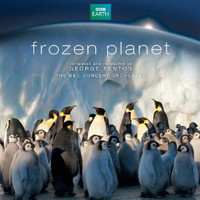- Composed by George Fenton
- Silva Screen / 2013 / 76m
An adelie penguin is building his nest. Patiently, carefully, he walks back and forth carrying stones and twigs, arranging them just how he wants them. He waddles up with another stone, places it just so, makes sure it neatly complements the others. He waddles off again to find another. Suddenly… another penguin who has been standing with his back turned waits until his rival is a safe distance, turns round, walks up to the nest… and steals that carefully-placed stone. “Thief!” says the cultured, authoritative, educational voice of the narrator – the world’s finest broadcaster, David Attenborough. The music – a kind of Russian classical pastiche – smoothly, soothingly accompanying the penguins’ deeds – has a little jolt of humour. This is beautiful, magical, unforgettable television – as good as it gets and as good as it’s ever got. The music is by George Fenton, the show is Frozen Planet, the BBC’s extraordinary documentary about life at the frozen extremes of Earth.
Fenton has been scoring projects for the BBC Natural History Unit since 1990’s landmark The Trials of Life. Since then, he’s done Life in the Freezer in 1993 (in many ways the precursor to this show, and in fact the first time that the now-famous emperor penguins’ incredible tale of survival was really told to the public), 2001’s The Blue Planet, 2006’s Planet Earth (arguably the finest show of its type) and 2009’s Life, along with a few one-off specials over the years. He has established a consistent sound in these shows – and a consistently outstanding quality of music, setting the standard by which all others must be judged. Life and Frozen Planet both came and went, incredibly, without soundtrack releases at the time; fortunately Silva Screen has now stepped in and released the latter.
Anyone familiar with any of Fenton’s past music for any of these shows will know what to expect – classy music, frequently soaring, frequently comic, frequently dramatic, unwaveringly brilliant. The bleakness of the world’s polar regions contrasts with incredible beauty and extraordinary drama, providing the composer with a wealth of inspiration to use for Frozen Planet. Various sequences involving penguins provide some of the musical highlights – their inherently comic nature must be a joy to score – and in fact it’s joy which is expressed without reservation in the early “Surfing Penguins”. The sequence described in my opening paragraph is scored with “Stones”, a sumptuous musical treat. “Leaping Penguins” is just as joyous and enjoyable as any piece of music with that title could be; the later “Emperors Return” a sweeping, rapturous celebration of one of the natural world’s most incredible journeys.
There are numerous delights elsewhere too. Polar bears have in many ways become the symbol of the world’s changing climate but for now (and not much longer) film crews are still able to find the last remaining bears living their lives in the wild – and life is still springing forth from them, albeit less than ever before, and it’s still beautiful – “Cubs’ First Hunt” is warm, magical, delightful music to accompany it. Later, “Lazy Bear” is a delightfully comic vignette. Marine life is of course plentiful too – musically accompanied by the grand, majestic “Narwhals”, magnificent “Belugas” and one of the real standouts, the exceptional “Seal Ballet / Arrival of the Humpbacks”.
There are moments of great drama – “Antarctic Mystery” is a serious, compelling piece; “Flying South” a particularly urgent and dramatic one. “Elephant Seal Duel” provides some frantic action music, electronics adding a touch of stark mystery to the explosive, brassy histrionics of the orchestra. The album’s longest track, the six-minute “Battle of Wills”, is also perhaps its most grandly dramatic, broad gestures of power from the orchestra gradually building and building to a frenetic climax. Some wonderfully romantic moments can be heard in the score too – the piano solos of “North Pole” and “Returning Seabirds / Albatross Love” mix with exquisite violin parts for simply sumptuous musical treats. Celebrations of the sheer beauty of the landscapes are rarely far away – the dazzling “Ice Sculptures” is magnificent, “Winter” a bleaker but no less beautiful portrait, “Greenland Patrol” a chilling accompaniment to the harsh messages of the final episode, starkly essaying the desperate plight of all the creatures that live at the ends of the earth as year-on-year more and more of their habitat melts away.
This is a wonderful album, lengthy but without a single moment I’d want to be without. Fenton has honed his style over the years and the result is a particularly consistent, impressive piece of work. The tv series itself has so many unforgettable moments, and George Fenton’s music is right there at the heart of all of them. So majestic are the images that it would be easy to simply let them speak for themselves – Fenton has to tread a delicate line between providing powerful accompaniment without ever overwhelming them – and he pulls it off with aplomb, time after time. Let’s hope it isn’t too long before he’s back with the BBC, doing it all over again for a new series.
Rating: *****
facebook.com/moviewave | twitter.com/MovieWaveDotNet | amazon.com













Great review, James. Needless to say, you and I have been on the same page regarding Fenton’s music since The Blue Planet.
Somebody make this man a saint. Saint George, patron of music for BBC nature documentaries…
All the best, CK 🙂
Excellent review James. The album is wonderful. Hopefully Silva Screen will release an album for Life as well before too long. It’s just a shame the UK Blu-ray release of Frozen Planet doesn’t have the isolated score track found on the US edition.